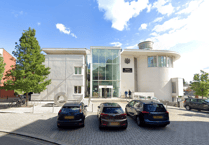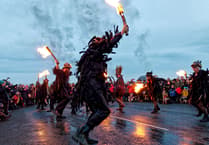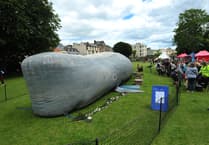A native of Normandy, Fernand Davoult has been a British citizen for 30 years. He speaks with a slight French accent, the occasional French word mixed in. Now living at Westlands Retirement Home in Reed Vale, he looks younger than his 88 years.
He stops to greet every staff member by name as we take the lift to his room, where framed war medals seem to belie his gentle nature.
Talking about his most recent award, he falters, pulling out a handkerchief. 'It was the best Sunday in my life,' he said. 'I didn't know I was going to get it. I couldn't believe it.'
His service in the Free French Navy has as much to do with the chaos of war as endurance and bravery. War altered the course of his life in ways he could never have imagined when, aged 13, he told his teacher that he was leaving school.
He got a job as a deckhand on a tanker. When the Germans marched into France, Fernand, then 19, was on the Léon Martin in the Romanian port of Constanza. In May 1940, the ship made it back to Bordeaux where a French naval officer advised them to make for England before the Germans arrived. The Léon Martin duly put into Falmouth, teeming with other foreign vessels displaced by the invasion.
'We ran out of food and water. Then the Navy came and seized our boat and gave us 24 hours to get out.'
He and his shipmates were sent to Crystal Palace where some 1,500 other Frenchmen were awaiting repatriation. French officers encouraged them to join de Gaulle, to be greeted with catcalls. All they wanted was to go home.
'Only a few volunteered. We had never heard of de Gaulle,' he said.
But after seeing German bombers fill the skies, he decided to volunteer. Davoult was taken to a Free French hostel in Gordon Street, north London. That night there was an air raid and he took shelter in the crypt of St Pancras Church, where he got talking to a pretty 18-year-old Eileen Sykes.
A year later in 1941, with £3.10s in his pocket he married Eileen, known as Margie, in the same church. They remained happily married for 67 years until her death last year.
'We had no cake for the wedding. We had a tin of pilchards, an accordion and a lot of beer.'
Initially Fernand volunteered for the merchant navy and was assigned to a rust bucket transporting pig iron from Canada.
'It was a boat from the First World War. There was no toilet, it was a terrible boat, no food, no electricity.'
There was mutiny and before long Fernand found himself back at Gordon Street, penniless. A French officer urged him to volunteer for the Free French Navy and this time Fernand did not argue.
'On Friday morning, with a slice of bread, a can of sardines and a bottle of wine I am on my way to Devonport to the biggest submarine in the world as a torpedo engineer.'
Davoult knew nothing about torpedoes or even what a submarine looked like. The submarine in question was the Surcouf, the largest submarine in the French fleet. The port authorities had underestimated the draught of the boat with the result that at low tide it listed in 7m of water, allowing acid to leak from its batteries.
The Surcouf had an unhappy history. In 1940 armed marines, sailors and soldiers boarded French ships lying at ports in Britain and Canada. The only serious incident was aboard the Surcouf, where two Royal Navy officers and a French warrant officer were fatally wounded, and a British seaman was shot dead by the submarine's doctor. Accusations were made by each side that the other was spying for Vichy France; the British also claimed that Surcouf was attacking British ships.
The crew was sent to a camp. When Fernand joined shortly afterwards, it was in a state of chaos with a motley untrained crew and primitive conditions. Luckily for him, Fernand contracted mumps and was sent to Stonehouse hospital just before the Surcouf sailed. In 1942 it was sunk in questionable circumstances.
After a short short spell aboard the submarine Junon, Fernand was sent to Plymouth in 1941 where he served for three years in the corvette Commandant Dragou.
'We managed eight corvettes under the French flag. We escorted the convoy in the Battle of the Atlantic. We went to West Africa twice and Sierra Leone, called the white man's grave, because of the malaria.
'We had no fridges or freezers, we took a few loaves with us, but they soon went mouldy. So we took some live pigs and kept them under the depth charges and made a little gate. The cook said one day I'm going to kill a pig. The pig was making a lot of noise, it was not very good. I could see a British officer watching us.'
They weren't the only animals on board; the crew also kept two monkeys, a cat, a goat and two dogs.
'Next day I went into an officer's room. There was a letter open on his desk. I read it, hoping it said that we could go home. It said "May I remind you, your Free French boat is a war boat and not a menagerie".'
Fernand says he survived many narrow escapes.
After the war, one of his first tasks was to find his mother. He returned to Le Havre to find that half the town had been flattened.
'I did find her later. I had told her I would only be away for three weeks and came home five years later.'





This article has no comments yet. Be the first to leave a comment.